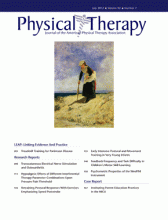Abstract
Background Providing adults with knowledge of results (KR) after each practice trial (100% KR) usually is found to be detrimental to motor skill learning compared with conditions in which feedback is less frequently provided. The effect of 100% KR on children's learning is less clear, with research showing that children with cerebral palsy benefit from less frequent KR, whereas children with typical development do not.
Objective This study was designed to examine the interaction of KR frequency and task complexity on the acquisition, retention, and transfer of a novel throwing skill in fourth- and fifth-grade children with typical development.
Design This was an observational study.
Methods Children threw beanbags for accuracy at an unseen target while walking or while standing still. These 2 levels of task complexity were crossed with 2 frequencies (33% and 100%) of KR provision. Following practice, retention tests without feedback were performed 5 minutes later and then 1 week later along with transfer tests to assess the generalizability of learning.
Results Analyses revealed that learning was improved on the easy version of the task when a 33% KR frequency was provided during practice. In contrast, in the difficult version, learning was facilitated by provision of a 100% KR frequency during practice.
Conclusions Structuring practice conditions for children should take into account task complexity and feedback frequency in determining the cognitive challenge necessary for optimal skill learning. More generally, the findings suggest that practitioners teaching motor skills should design practice conditions in accordance with the cognitive processing capacity of the learner.
Footnotes
All authors provided concept/idea/research design and data collection and analysis. Dr Sidaway provided writing, project management, participants, facilities/equipment, and institutional liaisons.
The authors thank the children of Dedham School in Maine, who enthusiastically participated in the study, and their parents, who allowed their children to take part in the study. They extend their gratitude to the faculty at Dedham School, especially to Kathy Lawson (principal) and to Tim Pearson, who allowed the authors to interrupt his physical education class on numerous occasions to collect data.
This study was approved by the Husson University's Institutional Review Board.
- Received November 4, 2011.
- Accepted March 8, 2012.












